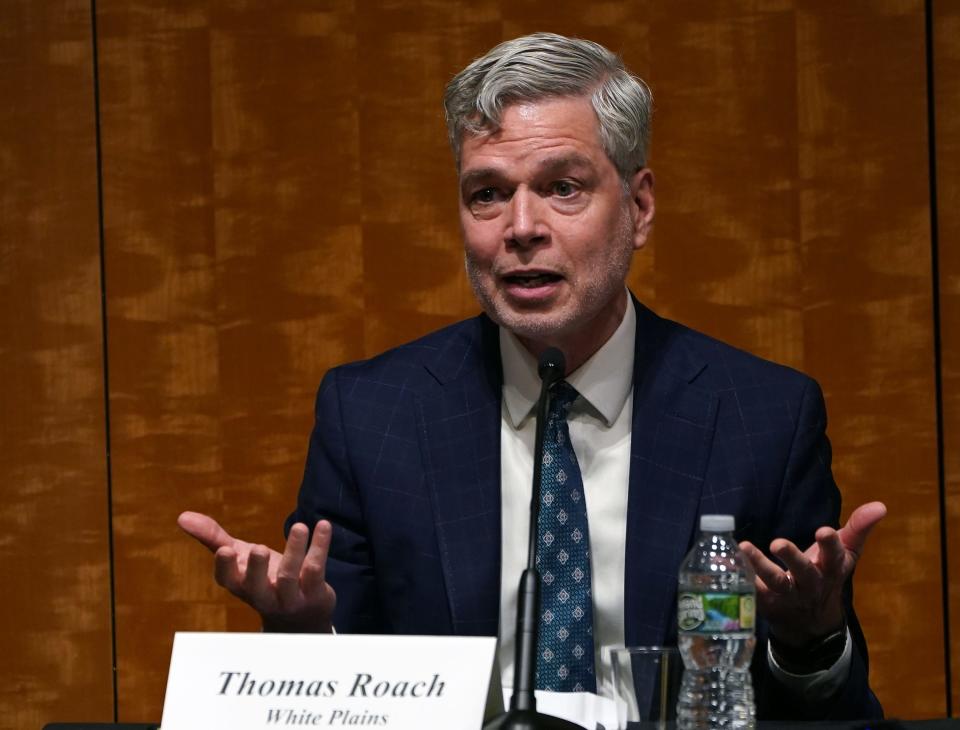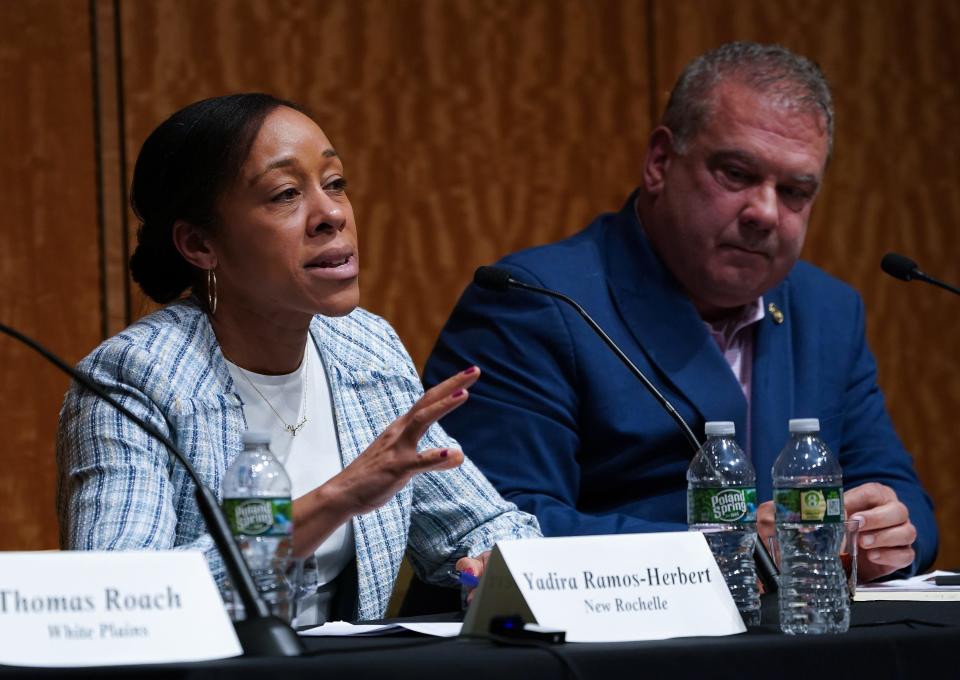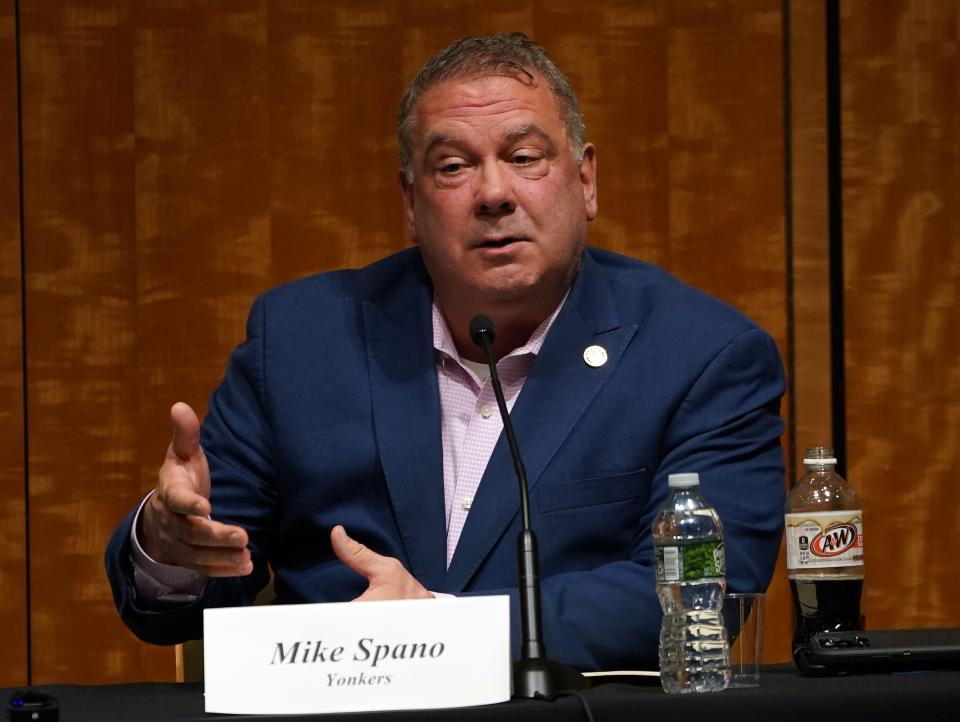Westchester mayors talk housing, infrastructure amid rapid development
As new housing developments become an economic engine for Westchester cities, mayors are now able to focus on prioritizing ways to keep development going and attract even more.
Mayors from White Plains, New Rochelle and Yonkers met March 14 for a roundtable discussion, hosted by the Building Owners and Managers Association of Westchester, to talk housing, infrastructure and other topics.
About 38,000 apartment units have been approved in the three cities, which have brought in millions of dollars in tax revenue.
Here are some takeaways from the panel discussion.

White Plains: Housing development considered an economic engine
About 20 years after the first wave of downtown revitalization, thousands of apartment units have been built in White Plains.
Nearly 8,000 new units have been authorized since 2015, and that much housing has the potential to bring as many as 12,000 new residents to the city, a 15%-20% increase over the current population of 60,000.
White Plains mayor Thomas Roach said the concept of transforming the former Macy’s store into a residential tower was novel a decade ago. Now it's part of the playbook.
The city is working with developers on redeveloping the former Galleria Mall, which could be the largest such project in the county, Roach said. A rezoning proposal to replace the 870,000-square-foot mall with residential towers, retail space and parks is still pending.
Roach said the housing development not only benefits construction groups but brings the community as a whole- as new tenants will be customers of local businesses and enhances a vibrant downtown.
“For me, my biggest job is to maintain the quality of life and the nature of the community that we have. Part of that is bringing in development,” Roach said. “A vibrant downtown is an engine that keeps taxes low and that’s what we have.”
More: New skyline rises in New Rochelle with apartment building boom; gentrification fears remain
Roach said developments would have little impact on the school district, traffic and infrastructure— if anything, things could improve thanks to tax revenues generated through these projects.
School districts have had little trouble absorbing new students who have moved to these new developments in White Plains, Roach said, due to the fact that enrollment in schools had already gone down.
While local infrastructure has faced challenges due to extreme weather exacerbated by climate change, development itself is not the main cause. The city assesses the potential impact for each new project and requires developers to pay for infrastructure improvements.
“There is no way to build infrastructure that can handle (it all). We’re doing the best we can. The city has always been maintaining the infrastructure, it’s an ongoing project,” Roach said.

New Rochelle: 'Housing development hit a sweet spot'
New Rochelle Mayor Yadira Ramos-Herbert stated that she believed housing development in Westchester’s second-largest city has hit a sweet spot.
Ramos-Herbert said the city’s streamlined approval processes has sped up development of thousands of new apartments. About 11,000 units have been approved and 6,400 units are either under construction or have already been built.
As the city plans to rezone some areas and allow for more housing development, Ramos-Herbert's vision will also focus on bringing in more retail businesses, redeveloping the waterfront and improving infrastructure. She highlighted one of the city's signature projects called The LINC that would transform a six-lane road into a local street and linear park. The project recently received $16 million in state funding.
“Just keep your eye on New Rochelle, there’s so much more to come. It’s really an exciting time to see our golden hour,” Ramos-Herbert said.

Yonkers: Hollywood on the Hudson
It took nearly 20 years for Yonkers to finally get recognized as a city with “so much potential” after fights over crime, segregation and more, said Yonkers mayor Mike Spano.
Over the past decade, Yonkers has grown by about 15,600 people to become the third-most populous city in New York. It has built the most new apartments in the state between 2016 and 2020, according to RENTCafe, a national rental service. About 19,000 units have been authorized, said Spano.
The next step: To make Yonkers the “Hollywood on the Hudson.”
Three movie studio campuses have broken ground in the area, including 26 studios and a public school featuring media production courses for students in grades 6 through 12.
Spano said housing in Yonkers is more affordable than neighboring cities and it remains in high demand.
“We need to build more,” Spano said.
He said the city is finding its sweet spot by taking advantage of financial incentives and other tools to attract developers amid high interest rates and inflation.
As the city is managing a tight budget due to a loss of federal funds and a $22 million increase in health care benefits for employees (that could bring up property taxes by 6%), the city is looking to attract deep-pocketed investors and to seek state and federal funding to improve infrastructure.
“We want to make sure we continue to increase the quality of life (in Yonkers) so people want to come, use our schools, work, make investments and be safe.” Spano said.
This article originally appeared on Rockland/Westchester Journal News: Yonkers, New Rochelle, White Plains mayors talk growth and development

